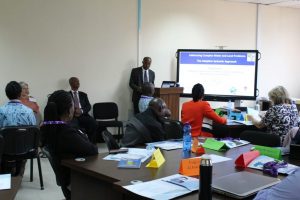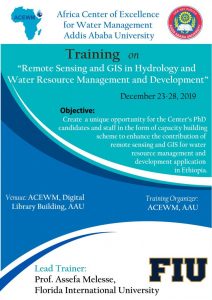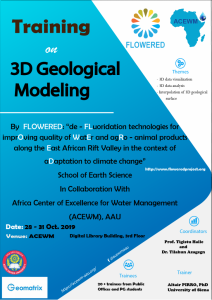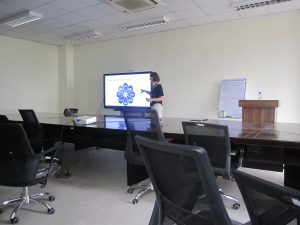ACEWM Conducts Virtual Training on E-learning Management System (Moodle)
Africa Center of Excellence for Water Management (ACEWM) has offered training on e-Learning for its affiliated faculty members virtually from 29 May–2 June 2020. The training was part of ACEWM’s plan to develop and operate an online teaching-learning platform based on Moodle e-learning management system. During the opening of the training, Dr. Feleke Zewge, Head of ACEWM, emphasized on the importance of the training on Moodle and Google meet to manage the teaching-learning process and to deliver lectures even beyond the COVID-19 Pandemic.
ICT coordinator of ACEWM, Dr. Wondwossen has delivered the virtual training on “AAU e-Learning management system” and “how to use Google meet to deliver interactive lectures effectively”. E-Learning was defined as a technology of learning management system that promotes teaching and learning using a computer web technology. The trainer affirmed that e-LMS may also provide students with the ability to use interactive features such as threaded discussions, video conferencing, and discussion forums. The system allows instructors to develop course materials, organize quizzes, set assignments, and access course-related information that are relevant for the students. In addition, it was explained that Google meet can also be used to deliver lectures interactively as it supports video calls up to 250 participants using G-suit education.
ACEWM hosting a training in collaboration with ARUA Water Center of Excellence

Africa Center of Excellence for Water Management is gladly hosting “Solving Water and Land Problems: Applying the Adaptive Systemic Approach (ASA) Water Resources Management (AWRM)” training in collaboration with ARUA water center of excellence: UKRI-GCRF capacity building foundation course and facilitated by Professor Tally Palmer, institute for water research, Rhodes University, from February 11-13, 2020.
ARUA water Center of Excellence is committed to working to put science, social science and society together to solve difficult land and water problem. The Adaptive Systemic Approach (ASA) is methodology to do this. Accordingly, Adaptive Water management is explained as the use of adaptive, systemic, processes and an understanding of complex social-ecological systems to coordinate conservation, manage and develop water, land and related resources across sectors within a given river basin, in order to maximize the economic and social benefits derived from water resources in an equitable manner while preserving and, where necessary, restoring freshwater ecosystems.
Hence, this training is designed for members of Catchment Management Forums (CMFs) and Catchment Management Agencies (CMAs). CMFs are made up of people who represent all the stakeholders in a catchment. They are the people who know the catchment best, and therefore are in the best position to alert CMAs to local issues and to help develop the strategic plans for their local catchment. However, catchments are dynamic*, complex* systems that need a special planning approach –and that is what this handbook is about. If one part of a catchment is neglected and damaged, it affects the whole system and everyone living in it. We use and recommend a flexible, adaptive approach in which everyone involved in the planning is both a teacher and a learner, and where everyone contributes their special wisdom to developing a sustainable plan for the catchment. (www.wrc.org.za).
The training was officially opened after a welcome speech was delivered by Dr. Feleke Zewge (Director of ACEWM), and consequent introduction about ARUA water CoE by Professor Tally Palmer (Rhodes University). Water professionals, 31 in total, from Burundi, Ethiopia, Mali, Namibia, Nigeria, South Africa, Tanzania and Uganda are attending the training.
Remote Sensing and GIS in Hydrology and Water Resource Management and Development training held at ACEWM
Africa Center of Excellence for Water Management (ACEWM) at Addis Ababa University organized a training on Remote Sensing and GIS in Hydrology and Water Resource Management and Development.
The training which was held on December 24-28, 2019 aims at creating a unique opportunity for the Center’s students in the form of capacity building scheme to enhance the contribution of remote sensing and GIS for water resource management and development application in Ethiopia.
The training was led by Prof. Assefa Melesse, of Florida International University, USA.
It was focused on acquainting students with the application of remote sensing principles and geospatial analysis to water resources.
More than 20 post-graduate students of the Center have benefited from the training. It is believed that training will increase and improve Ethiopian experts and researcher’s capability in the area of remote seining and GIS application for water resource management and development programme.
Software applications like the ENVI/ERDAS Imagine and ArcGIS were used during the training.
Upon completion of the training, Dr. Feleke Zewge, Center Director of ACEWM congratulated the trainees and stated his hope that the students will be applying the knowledge and skills obtained from the short term training on their research activities.
Prof. Assefa Melesse for his part reiterated his believe that the training will be a good base for the attendees in providing the basis for further study and capacity building in the area of remote sensing and GIS.
Remote Sensing and GIS in Hydrology and Water Resource Management and Development

Date: December 23-28, 2019
Location: African Center of Excellence for Water Management, Addis Ababa University
Time: Monday-Saturday: 9:00AM-5:00PM
Instructor: Assefa M. Melesse
E-mail: melessea@fiu.edu
COURSE DESCRIPTION: The course will acquaint students with the application of remote sensing principles and geospatial analysis to water resources. Remote sensing based analysis as well as vector and raster GIS will be used to analyze and model watershed processes. Various concepts of remote sensing techniques, sensors and platforms, electromagnetic spectrums, sensors and atmospheric interactions, image noises, image pre and post processing, atmospheric and radiometric corrections, image enhancement, image classification, interpretation, land-cover change detection and accuracy assessment as applied to water resources management and natural resources mapping and analysis will be covered. Grid-based input data preparation, watershed delineation, flow analysis, routing, overland and channel flow estimation and hydrograph development will be covered. Modeling water quality in a GIS environment will be covered. The use of GIS and remote sensing in spatially distributed watershed analysis, mapping and modeling will be presented using lectures, exercises and individual project.
COURSE OBJECTIVES: The primary aim of this summer school based training is to create a unique opportunity for the Center’s PhD candidates and staff in the form of capacity building scheme to enhance the contribution of remote sensing and GIS for water resource management and development application in Ethiopia. More specifically, this training is important to promote the use of remote sensing and GIS technologies and applications in order to:
- Understand remote sensing and GIS concepts and principles for water resource management and development programme in Ethiopia;
- Perform radiometric and geometric image correction to classify images, generate information and perform classification validation analysis;
- Apply remote sensing and GIS technologies to understand components of the different hydrologic cycle such as precipitation, basin/watershed/catchment characterization, evapotranspiration, soil moisture, surface water, soil erosion, water quality and quantity analysis;
- Acquire spatial data and create hydrologic input parameters from remotely-sensed data for hydrologic modeling;
- Understand modeling protocols in geospatial hydrology;
- Understand and use geospatial statistics in watershed analysis; and analyze spatial flow and learn runoff routing techniques
Benefits and Broader Impact of the Training
This training will increase and improve Ethiopian experts and researcher’s capability in the area of remote seining and GIS application for water resource management and development programme.
Training Organizer
African Center of Excellence for Water Management, Addis Ababa University
Lead Trainer:
Assefa Melesse, Florida International University
Contents of the Training:
The following contents shall be covered during the training.
Contents of the Training:
The following contents shall be covered during the training.
Training on “3D Geological Modelling” held at ACEWM
.
Short training on 3D Geological Modelling organized by FLOWERED, School of Earth Science in collaboration with Africa Center of Excellence for Water Management (ACEWM) kicked off on October 28, 2019, at the Center’s computational laboratory.
The training is an initiative of FLOWERED: “de – FLuoridation technologies for improving quality of WatEr and agRo – animal products along the East African Rift Valley in the context of adaptation to climate change” and hosted by ACEWM, Addis Ababa University.
The courses is offered by Dr. Altair PIRRO of the University of Siena. Prof. Tigistu Haile and Dr. Tilahun Azagegn from the School of Earth Science, Addis Ababa University facilitated the training.
Dr. Feleke Zewge, Center Director of ACEWM in his opening remark highlights that it is fundamental to work in collaboration with a multitude of actors in the area of water management like that of FLOWERED.
“This collaboration on offering a short training should be just the first one, as we can continuously partner in a variety of ways like field research activities in water-related themes particularly on de-fluoridation which is also one of our focus areas” added Dr. Feleke.
Introduction to GIS and 3D GIS, Mentions to planar and vertical reference systems, Introduction to ESRI ArcGIS Pro, and differences with other 2D GIS desktop software are some of the training topics that are covered on the training.
On the opening session, Prof. Tigistu Haile, a local partner of FLOWERED reiterated the importance of establishing a lasting collaboration with regional Centers like ACEWM. He further elaborated on the importance of such capacity-building training in helping the trainees achieve their goals through conducting high-quality researches in water quality and de-fluoridation.
“3D Geological Modelling would benefit geologists and other researchers in the area of land management to better conduct their research”, added Prof. Tigistu.
FLOWERED aims to contribute to the development of a sustainable water management system in areas affected by fluoride contamination in water, soils, and food in the African Rift Valley countries (Ethiopia, Kenya, Tanzania), with the aim of improving the living standards for the local population.
More than twenty selected trainees from public offices and postgraduate students of Addis Ababa University participated in the training. The training was concluded on the 31st of October 2019.
Training on 3D Geological Modeling set for October 28-31, 2019
More than twenty trainees from public offices and students are expected to take part in the training!

The training will be given under the FLOWERED Project themes in collaboration with the Africa Center of Excellence for Water Management at Addis Ababa University.
More than twenty trainees from public offices and students are expected to take part in the training.
The training will be delivered by Dr. Altair PIRRO from the University of Siena and coordinated by Prof. Tigistu Haile and Dr. Tilahun Azagegn of AAU.
It is believed that the training will boost the research capacity of the trainees.
Short Courses and Training Enhancing Capacity in Water Management
Training on Geographic Information System and Mobile Data Collection for School WASH monitoring in Ethiopia were delivered to WASH in school experts of the Ministry of Education as part of the National WASH Program.
Additionally, Data analysis and Interpretation using SPSS/SATA were offered to WASH experts in schools that aimed at building the capacity of water sanitation and hygiene experts in monitoring and evaluation.
All the training modules were delivered by well-experienced resource persons of the Center and the University.
Moreover, ACEWM Co-Organized the AOSP Training offered this year for senior and junior researchers in the field of advanced computational methods and emerging electrochemical energy materials to share ideas, experiences, and disseminate knowledge and skills. A total of around 40 participants from 17 Universities of Ethiopia have participated in the workshop.
It is recalled that Environmental/Pesticide Risk Assessment Management, Urban Wastewater, and Storm Water Management, and Transferable Skills for Master’s and Ph.D. Researchers: Team-Working, Creative Thinking, and Effective Communication were some of the training convened in 2018.
ACEWM Co- Organized the AOSP Training

The workshop covered the fundamentals and hands-on training on advanced and widely used computational methods (i.e., Density Functional Theory, Molecular Dynamics and Monte Carlo methods). Moreover, recent scientific advances in the field of emerging electrochemical energy conversion and storage technologies such as advanced rechargeable batteries, supercapacitors, fuel cells and solar cells will be discussed. The main goal of this scientific conference is to help junior researchers in some Universities of Ethiopia, who are interested to work on various computational methods for studying materials properties (i.e., electronic, optical and magnetic). The workshop bring together senior and junior researchers in the field of advanced computational methods and emerging electrochemical energy materials to share ideas, experiences, and disseminate knowledge and skills. A total of around 40 participants from 17 Universities of Ethiopia are anticipated to participate in the workshop. Moreover, 6 senior researchers/professors from outside Ethiopia (i.e. ICTP/Italy, epfl Switzerland, Denmark and …) will give presentations and also involve in hands-on training. The workshop will be organized jointly by College of Natural and Computational Sciences of Addis Ababa University and ICTP Trieste Italy.
ACEWM Organized training of trainers
Africa Center of Excellence for Water Management organized a training of trainers on Geographic Information System (GIS), Mobile Data Collection (MDC) using ODK & KoBotoolbox, Statistical Package for the Social Sciences (SPSS), and STATA for Water, Sanitation and Hygiene (WaSH) Ministry of Education. Ministry of Education (MOE) is the leading ministry in school Water, Sanitation, and Hygiene (WaSH) development in the country and is mandated to capacitate education bureaus, offices, and schools to play their role in creating a conducive environment for quality education and wellbeing of the children by providing standardized school WaSH services in collaboration with stakeholders and development partners.
The main objective of the training of trainers is to enhance the knowledge and skills of the trainers on the basic knowledge of GIS and SPSS/STATA with intention of cascading the training to relevant regional WASH Specialists. The training is being organized with the aim of overarching goal for strengthening the technical capacity of the federal ministry staff for use of research and other evidence in decision-making aimed at tackling WaSH and development issues.
.

